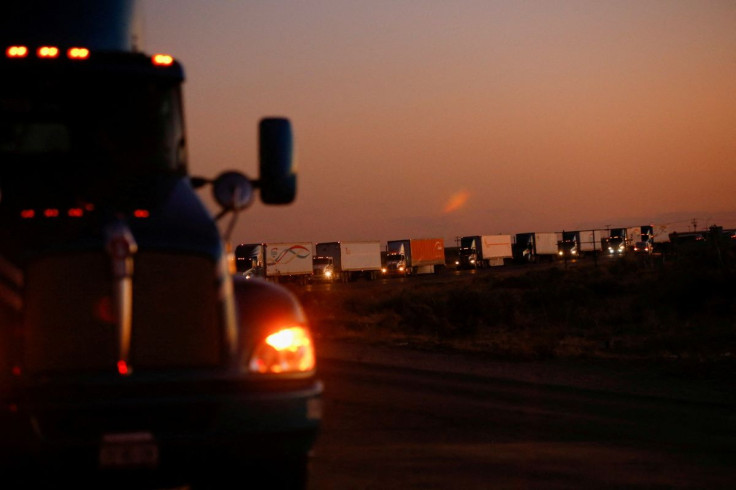Simply Logical: Why Logistics Needs Blockchain
Whether you drive or not, chances are you’re feeling the burn of rising gas prices.
After all, paying more for fuel isn’t just about getting from A to B. Rising transportation costs are pushing up prices throughout the global supply chain, making everything from food and furniture more expensive for consumers and small businesses.
Nor is fuel the only problem. The supply chain crunch is being exacerbated by labor shortages, extreme weather and other factors.
This escalating crisis is making it clearer than ever that having an efficient, dependable logistics infrastructure is vital to our society.
The logistics industry’s reliance on fossil fuels also comes at a hefty environmental cost: According to the U.S. Environmental Protection Agency, organizational supply chains can account for as much as 90% or more of corporate greenhouse gas emissions.
It can be easy to assume that the answers to these problems will come from the top down — that governments and multinational corporations will step in to fix our broken systems and lay the groundwork for a better, more sustainable future. But big bureaucracies move slowly, and with geopolitical tensions on the rise and climate change accelerating every day, any solutions may come too late.
Instead of waiting for government regulations and big-tech innovations that may never come, we need to act now to create decentralized solutions that allow people and communities to help one another. We can accomplish this with blockchain technology.
Decentralized Technology and Philosophy — It Isn’t Just About Finance
In decentralized systems, there is no single authority that decides who can and cannot participate. Instead, people interact and transact directly with one another without the need for oversight or approval from a third party. Participants in decentralized systems are free to buy and sell goods, provide services or exchange assets without going through a middleman.
Decentralized lending services, for instance, reward individuals for contributing their resources to asset pools for users to borrow from. This cuts out top-down managers who decide who can and cannot borrow, and collect any profit made on loans.
Decentralization Makes Logistics More Manageable
Today’s logistics industry is highly centralized, with a small cadre of companies controlling the flow of trillions of dollars’ worth of raw materials and finished goods all over the world.
So how could decentralization help the logistics system?
Just as decentralized lending protocols empower borrowers and lenders to deal directly with each other, a decentralized blockchain-based logistics infrastructure could enable individuals to provide one another with fast and low-cost transportation of vital goods.
A commuter who regularly travels from her home in a rural area to her job in the city could carry boxes of produce from the local farm to a market stall. And on her way home, she could ferry a prescription from the urban pharmacy to her neighbors in the countryside.
In this kind of system, everyone wins: the farm and the neighbor save on delivery costs while, in exchange for her contribution, the commuter earns financial credits to offset the high cost of fuel needed for her journey to and from work.
The environmental impact of each delivery is also significantly reduced — without the commuter, each delivery would have required a separate trip. Decentralized logistics systems also have the potential to handle large-scale deliveries across borders. And the farther the trip, the bigger the environmental benefit. For instance, truck drivers returning from long-haul journeys could sign up to use extra space in their rigs to carry freight, eliminating the need for an additional trek.
Decentralization Can Make Logistics and Supply Chain Systems More Resilient
Centralization can also make systems vulnerable to bottlenecks. As power becomes more concentrated within any given structure, so too do potential points of failure. Suppose a single company delivers groceries to an entire region. What happens if there is a computer malfunction at headquarters? Or if picketing workers block the exit from the depot? Or if a trainee dispatcher routes deliveries to the wrong locations?
Decentralization reduces the impact of human error and unforeseen issues on a system by distributing power and responsibility.
Imagine if those grocery deliveries were instead carried out by a network of autonomous individuals. In that case, it is unlikely that any single factor could shut down the entire system. Since each driver would be starting out from a different location (e.g. their homes or offices), roadblocks that might prevent trucks from leaving a depot couldn’t stop the system from operating. Similarly, because drivers are acting independently, a computer glitch that might have disrupted a delivery company’s entire workflow would only affect one actor, rather than all.
The benefits of using blockchain in a logistics system also include improving security with the technology’s tamper-proof nature and automating rewards for top drivers.
Decentralization for a More Resilient Future
If the events of the last few years have taught us anything, it’s that the systems we take for granted can fail overnight. And indeed, supply chains around the world ground to a halt repeatedly during the COVID-19 pandemic, causing knock-on disruptions still affecting the economy today. And if current geopolitical and environmental trends continue along their current trajectories, we may be in store for many more.
̧Blockchain technology makes it possible to create and codify an automated, decentralized logistics system that keeps a faithful, up-to-the-minute and completely transparent record of activity and transactions. In this way, we can organize community resources so they benefit everyone — significantly reducing financial and environmental costs while easing the economic strains now faced by individuals, small businesses and their communities.
People deserve a logistics infrastructure that is more flexible, resilient and efficient than the one we currently have. So let’s build it.
(Carla Ferreri is the CEO of Gepek, a 24/7 carpooling delivery platform that helps thousands of people send and receive packages within cities and across long distances)

© Copyright IBTimes 2025. All rights reserved.





















